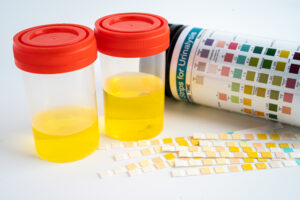We have all seen fake urine sold at gas stations or heard about people trying to cheat a drug test.
However, it is hard to measure how many people try to cheat each day. Some studies say that 31% of drug users have used detox drinks to avoid getting caught by the employer, 23% have reported they substituted urine samples, and 20% have diluted the urine sample with water.
There are three methods of cheating on a urine drug test
- Dilution
- adulteration, and
- substitution
Did you know that cheating or using synthetic urine is illegal in many states across the U.S.?
Over the last decade, many states have made it a misdemeanor or crime that can fine people thousands of dollars and even potential jail time.
[Related: Is There a Drug Problem in the Trucking Industry?]
Do you need an MRO?
Do you need a highly trained Medical Review Team or Medical Review Officer to help you remain compliant with all your drug and alcohol testing needs?
If you are unsure whether or not you need a Medical Review Officer, here are three reasons you would need one. If you are still unsure, please call us.
- You need an MRO to process all of your drug and alcohol testing results.
- You need your results turned around quickly and efficiently.
- You need a highly trained medical review team to help you remain compliant with all your drug and alcohol testing needs.
For more information, contact us at 800.551.9816 or info@cnsoccmed.com.
Which states have drug test cheating or synthetic urine rules?
As the first state to pass a drug test cheating law, Texas law considers a person guilty of a misdemeanor if that person “knowingly or purposefully manufacturers, delivers, owns, uses, or possesses a substance or device designed to falsify a drug test result.”
In Pennsylvania, the act of evading or causing deceitful results in a test for drugs constitutes a third-degree misdemeanor, which includes 6 months to 1 year in prison and a fine of up to $2,500.
Florida’s law says that “It is unlawful for any person willfully to defraud or attempt to defraud any lawfully administered urine test designed to detect the presence of chemical substances or controlled substances; and willfully to manufacture, advertise, sell, or distribute any substance or device which is intended to defraud or attempt to defraud any lawfully administered urine test designed to detect the presence of chemical substances or controlled substances.” If found guilty, it is a misdemeanor of the first degree, which is an offense punishable by up to one year in jail, a $1000 fine, and twelve months of probation.
It’s against the law in Illinois to possess, manufacture or sell substances or methods that help people cheat on drug tests. This includes synthetic urine, adulterants, or devices intended to help people smuggle these things in. It’s also illegal to substitute or adulterate your specimen. A violation of this Section is a Class 4 felony for which the court shall impose a minimum fine of $1,000.
In 2017, Indiana and New Hampshire banned synthetic urine.
Since June 2022, bills in Michigan that would criminalize fake urine and similar products used to pass a drug test are awaiting a vote from Michigan’s House. The bills would make it a misdemeanor to distribute, deliver, sell, or possess with intent to distribute products used to defraud an employer’s drug test.
In July 2021, a Mississippi law set penalties for selling, marketing, or giving away real human urine or fake urine to try to produce clean results on drug tests. A first offense is a $1,000 fine and up to six months in jail. For a second offense, it is a $2,000 fine and up to a year in jail. A third or subsequent offense is punishable by up to $5,000 and three years in prison.
In New Jersey, It is illegal to use someone else’s urine sample for a court ordered drug test in New Jersey, as well as for workplace drug testing for a variety of positions. It’s also illegal to use your own urine that you collected at a different point in time. New Jersey classifies these actions as fraud, and if you’re caught, you can be charged with the third-degree crime of Defrauding the Administration of a Drug Test. Conviction can land you in prison for 3-5 years and carries fines of up to $15,000.
It is unlawful in North Carolina for a person to sell, give away, distribute, or market urine in this State or transport urine into this State with the intent that it be used to defraud a drug or alcohol screening test; attempt to foil or defeat a drug or alcohol screening test by the substitution or spiking of a sample or the advertisement of a sample substitution or other spiking device or measure; adulterate a urine or other bodily fluid sample with the intent to defraud a drug or alcohol screening test; possess adulterants that are intended to be used to adulterate a urine or other bodily fluid sample for the purpose of defrauding a drug or alcohol screening test; and sell adulterants with the intent that they be used to adulterate a urine or other bodily fluid sample for the purpose of defrauding a drug or alcohol screening test. A violation for a first offense under this section, the person is guilty of a Class 1 misdemeanor. For a second or subsequent offense under this section, the person is guilty of a Class I felony.
Oklahoma imposes a $1,000 fine and up to one year in prison on anyone who helps another person cheat on a drug test.
Oregon makes cheating a drug test a Class B misdemeanor with a maximum fine of $2500, or up to 6 months in jail. The law states, “A person commits the crime of falsifying drug test results if the person intentionally uses, or possesses with intent to use, any substance or device designed to falsify the results of a drug test of the person.”
South Carolina has a comprehensive law that includes individuals who “provide substances or devices for the intent of cheating on a drug or alcohol test as well as those who would use such substances or devices.” The penalty for first-time offenders includes a fine of up to $5,000, or up to 3 years in prison, or both.
Virginia also makes it a class 1 misdemeanor for a person to sell, give away, distribute, transport or market human urine in the Commonwealth with the intent of using the urine to defeat a drug or alcohol screening test; attempt to defeat a drug or alcohol screening test by the substitution of a sample; or adulterate a urine or other bodily fluid sample with the intent to defraud a drug or alcohol screening test.
Other states with anti-drug test cheating laws include Arkansas, Nebraska, North Dakota, and Wyoming.
Other states with laws making it illegal to sell or use synthetic urine include Louisiana and Oklahoma.
Drug and Alcohol Testing Services
CNS Occupational Medicine also offers a comprehensive Drug and Alcohol Consortium Service and are a certified consortium and third-party administrator (C/TPA).
Our experts ensure that all DOT rules and regulations are followed, including the implementation of random drug tests for you and your drivers, updating your company drug testing policies, record retention and document purge management.
We take all the necessary steps and precautions to keep you and your drivers compliant with the DOT drug and alcohol testing requirements.
For more information, contact us at 800.551.9816 or info@cnsoccmed.com.










